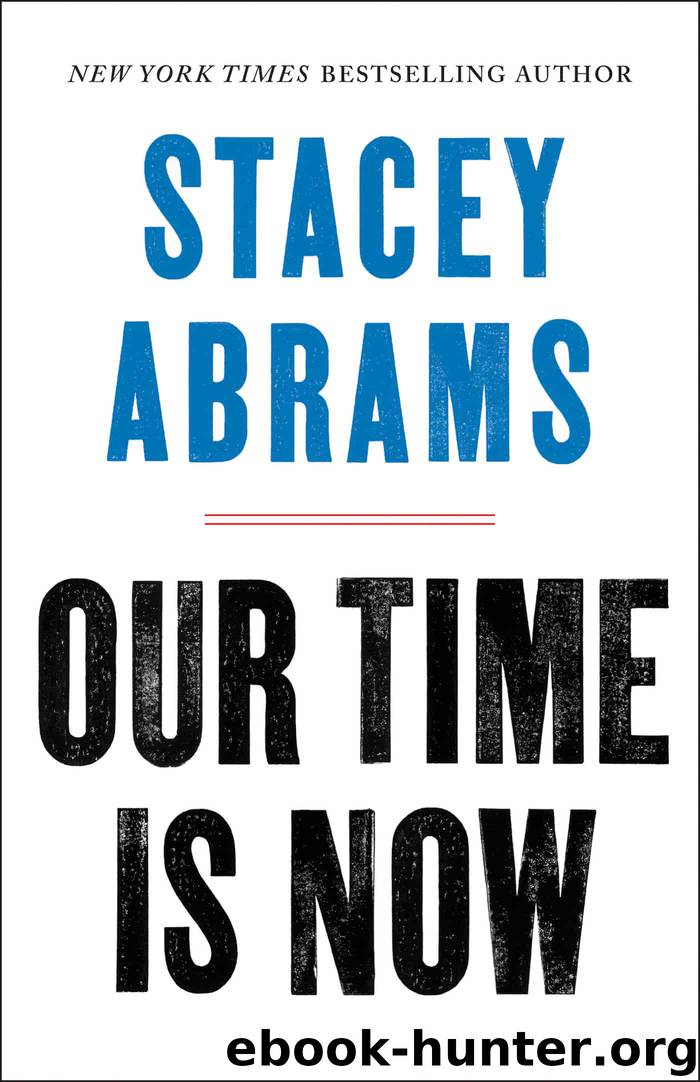Our Time Is Now by Stacey Abrams

Author:Stacey Abrams [Stacey Abrams]
Language: eng
Format: epub
Publisher: Henry Holt and Co.
Published: 0101-01-01T00:00:00+00:00
CLASS WARFARE BEGINS
In the early history of the United States, the political players pretty much looked alike. The moniker we use almost says it all: the Founding Fathers. If we add the modifier “white,” then the description would be accurate. To be fair, we have all heard the quiet role others played in the intellectual history of our fundamental documents, like Benjamin Banneker and Abigail Adams, but the principal architects were uniformly white men.
The U.S. Constitution reveals this original identity as the one to be protected at all costs. Social movements anchored by identity began nearly as soon as the country did, between the abolitionists opposing slavery, women demanding suffrage and equality, and the poor of every race being exploited for their labor. The fight over slavery led inexorably to the Civil War, Reconstruction and Jim Crow, and the civil rights movement. Women’s suffrage became a multigenerational movement that culminated in the Equal Rights Amendment. Juxtaposed beside these fights over race and gender, Americans have long waged a political fight to use class as a centrifugal force, and, in several ways, class identity has had more success and a nearly parallel history.
Almost as soon as the country produced wealthy Americans, the overworked and underpaid railed against their lack of economic opportunity. A nascent political tradition called populism latched onto the disorganized fight for economic justice and, in short order, elevated the debate to the national stage. In the nineteenth century, the Know-Nothing Party denounced immigrants, Catholics, and minorities, insisting that their advancement came at the expense of white Protestants. For them, using the plight of the working white man cloaked an identity politics that shunned anyone who did not support white Christian supremacy, and they plied their ideology from 1849 until 1860. The Greenback Party, largely comprised of farmers, emerged in 1874 to demand an eight-hour workday and broader labor reforms. Like the Know-Nothings, they recognized the importance of political influence, and the party ran candidates for president until it dissolved in 1884. The remnants of the Greenbacks folded into the Populist Party, which also absorbed the Farmers’ Alliance, emerging in 1890 as a prominent third party, winning seats in both the U.S. House of Representatives and the U.S. Senate. However, they shared the aims of the Greenbacks, such as support for collective bargaining and suspicion of the Know-Nothings, who reviled minorities. Despite seeking to build a wider tent—one that allowed white women to take prominent roles in shaping policy and organizing—the Populist Party largely rejected inclusion of blacks in their ranks, and, by 1908, their inability to cultivate urban support led to their demise.
William Jennings Bryan emerged at the tail end of one of the most intense clashes over class and economic security, and he became the most famous class warrior and populist of the nineteenth and twentieth centuries. A loyal Democrat, Bryan railed against moneyed interests and monopolies, promoting instead the needs of the “common man.” He represented the state of Nebraska in Congress but rose to national prominence at the 1896 Democratic convention.
Download
This site does not store any files on its server. We only index and link to content provided by other sites. Please contact the content providers to delete copyright contents if any and email us, we'll remove relevant links or contents immediately.
| Anarchism | Communism & Socialism |
| Conservatism & Liberalism | Democracy |
| Fascism | Libertarianism |
| Nationalism | Radicalism |
| Utopian |
The Secret History by Donna Tartt(19090)
The Social Justice Warrior Handbook by Lisa De Pasquale(12190)
Thirteen Reasons Why by Jay Asher(8910)
This Is How You Lose Her by Junot Diaz(6887)
Weapons of Math Destruction by Cathy O'Neil(6281)
Zero to One by Peter Thiel(5802)
Beartown by Fredrik Backman(5754)
The Myth of the Strong Leader by Archie Brown(5508)
The Fire Next Time by James Baldwin(5446)
How Democracies Die by Steven Levitsky & Daniel Ziblatt(5219)
Promise Me, Dad by Joe Biden(5153)
Stone's Rules by Roger Stone(5088)
A Higher Loyalty: Truth, Lies, and Leadership by James Comey(4964)
100 Deadly Skills by Clint Emerson(4926)
Rise and Kill First by Ronen Bergman(4789)
Secrecy World by Jake Bernstein(4753)
The David Icke Guide to the Global Conspiracy (and how to end it) by David Icke(4720)
The Farm by Tom Rob Smith(4514)
The Doomsday Machine by Daniel Ellsberg(4490)
